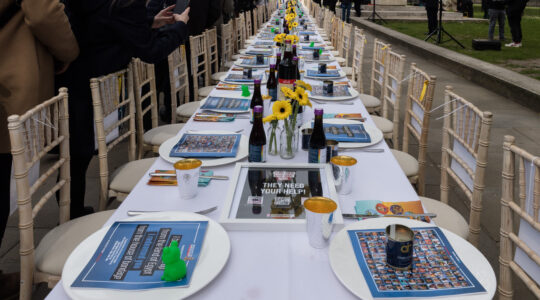ISTANBUL (JTA) – With a synagogue, two kosher butchers and a beach club where Jewish teens can listen to loud Turkish pop music, the verdant island of Buyukada is the summer home of Istanbul’s Jews.
Buyukada, about an hour on the ferry from Istanbul, also has a kosher restaurant, and on a recent Sunday evening Nisim Cohen, a 30-something textile manufacturer clad in shorts and a polo shirt, sat with his family on its deck overlooking the blue waters of the Marmara Sea.
The scene was idyllic, but Cohen’s mind was not at rest.
Turkey will hold parliamentary elections on July 22 – the most important election in 50 years, Cohen says – and Cohen sees no good options at the ballot box.
The liberal-Islamic Justice and Development Party, or AKP, has ruled Turkey for the past five years, bolstering the economy and moving Turkey closer to European Union membership. But AKP also has been accused of working to undermine Turkey’s secular foundations, and that worries Cohen.
On the other side, the leading secular opposition party, the Republican People’s Party, or CHP, has grown increasingly hostile to the United States and the European Union, and has a poor track record on minority rights and economic liberalization. CHP also has hinted it might form a coalition with the far-right Nationalist Action Party, whose record on minority rights is even worse.
Despite this, Cohen said, he will vote for CHP on Election Day.
“I don’t like them, but I don’t have a choice,” Cohen said. “The AKP shows a nice face, but in their hearts I fear they want to make this an Islamic country. They will not keep the republic as it is.”
This sentiment is shared by many of Turkey’s 20,000 Jews, most of whom appear to be throwing their support, with little enthusiasm, behind the secularist CHP.
The community’s official leadership does not make political endorsements.
With polls showing AKP headed for another victory in Parliament, Jews who support CHP say they hope their vote will help create a stronger opposition to check the government’s powers.
“The last year put questions in our mind,” said Viktor Kuzu, an advertising executive and former columnist for Turkey’s Jewish weekly, Salom. If AKP “could have the power to change the educational system, the court system and interrupt the way we live, then that is not a good option. So let’s have an AKP government that is still in charge but has less power. Hopefully that will be the scenario.”
This year’s elections come in the wake of a political crisis provoked this spring when AKP tried to have Parliament elect Foreign Minister Abdullah Gul, a perceived moderate but with Islamist roots, as Turkey’s president. Gul’s presidential bid led to a parliamentary and constitutional showdown in which Turkey’s powerful military weighed in and warned AKP about maintaining the country’s secular character.
Nevertheless, the AKP-led government has earned mostly rave reviews.
Having inherited a country mired in fiscal woes, AKP turned around the Turkish economy and attracted substantial foreign investment to the country.
Jewish community officials say relations between the party’s leadership and the Jewish community are excellent. And despite some initial fears after the AKP won in the last election, ties between Ankara and Jerusalem remain on track. Though there have been some bumps along the way, such as AKP inviting Hamas leaders for an official visit to Turkey, Israel and Turkey enjoy strong cooperation on trade, energy and military issues.
Still, doubts remain about the role Islam plays in AKP policies. Although the party has not made any sweeping changes to Turkey’s secular order, there are concerns that it is instituting incremental changes, often on a local rather than a national level, to increase the role of Islam in public life.
“They change small things,” said Denis Ojalvo, an Istanbul businessman involved in Jewish communal affairs. “They appoint people of the wrong ilk to key positions, and then one day you wake up and everything has changed.”
At the same time, Jews are disturbed by a political trend on the other side: Hard-line secularist criticism of AKP increasingly is being accompanied by rhetoric that is anti-European, anti-American and, lately, anti-Israel.
Several mass pro-secularism rallies held in Turkey this spring were distinctly anti-American. Also, in the last few weeks a thin volume called “The Children of Moses,” which purports that Turkish Prime Minister Recep Tayyip Erdogan and his wife are crypto Jews secretly working with the Mossad to weaken Turkey’s secularism and control Turkey via the AKP, has been a hot seller.
Ojalvo admits that some of the CHP’s anti-Western rhetoric bothers him, but says he is willing to give the party a chance.
“I want a strong opposition that will block the insertion of fundamentalist cadres into government,” he said. “This would de facto change Turkey.”
Jews who support the secularist CHP find themselves at odds with Turkey’s two other visible religious minorities, the Greeks and the Armenians. They appear to be backing AKP, which portrays itself as the party of human rights and democracy.
AKP is “more liberal toward the minorities,” said Mihail Vasiliadis, editor of Istanbul’s Greek-language daily, Apoyevmatini. “I do not deny that they are Islamists, but they are the only party that will guarantee Turkey’s integration with Europe.”
“When you look at the other parties, they consider minorities as part of another nation. They see us as a cancer within the nationalist structure,” he said.
Historian Rifat Bali, who specializes in Turkish Jewry, says the prospect of Islamicization is of paramount concern to the country’s Jews.
“The Jewish community is more concerned with the question of Islamicization than other minorities because Islamicization in Turkey has been synonymous with anti-Semitism,” Bali said.
It’s a danger that does not exist for Christians, he said, adding that “their concern is extreme nationalism.”
By contrast, Jews seeks equality, which Bali said “can only be attained in a secular society, not one that is Islamist.”





